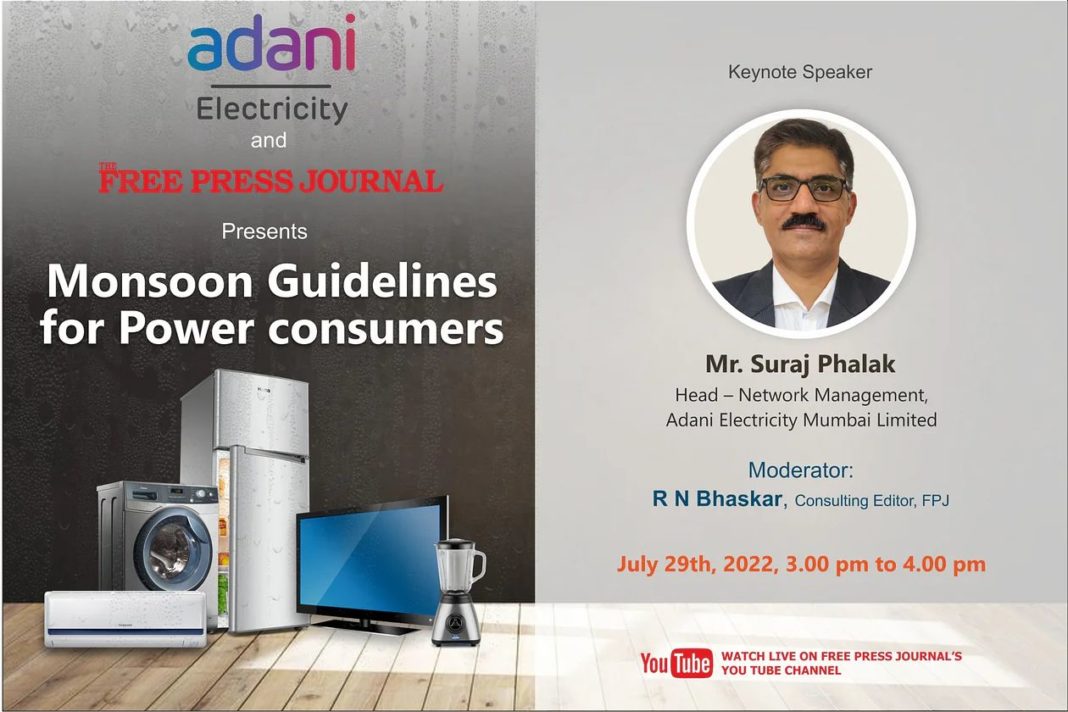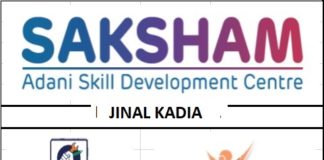https://www.freepressjournal.in/analysis/at-75-india-is-still-confused
‘Unauthorised electricians working on electrical network is a major concern’
AEML organizes community awareness sessions in April and May as the rains usually arrive in June, says Suraj Phalak, Head, Network Management, Adani Electricity Mumbai Ltd.

The monsoons are here and for Indians, it is a metaphor for celebrations, hope, relief from summer, and the beginning of the sowing season. Lasting from June to September, the rains are sometimes erratic and the impact of monsoon is different from place to place. While Indians, prepare for the season well in advance by purchasing an umbrella, avoiding communicable disease, putting tarpaulins where we expect leakage, etc., but, amid all this; investing in safe and robust electric circuit protection devices takes a backseat due to a lack of awareness.
The Free Press Journal in association with Adani Electricity Mumbai Ltd (AEML) organised a webinar on ‘Monsoon Guidelines For Power Consumers,’ highlighting the issue of how people can stay safe during monsoon.
AEML Head Network Management Suraj Phalak spoke to R N Bhaskar – with editorial support from Dominic Rebello (both from FPJ) — mainly focusing on the safety precautions a consumer should heed during monsoon. Phalak is leading the Network Management function and ensuring uninterrupted power supply to more than three million consumers in Adani Electricity, Mumbai. Phalak has over 29 years of experience in electrical network design, distribution network management, SCADA, budgeting, and project Management.
Excerpts…
About AEML
AEML is an integrated utility with its own power generation plant at Dahanu. We generate 500 megawatts of power which is transmitted to Mumbai via our transmission lines over 480 km of overhead lines. We have 8 EHV stations in Mumbai, which are connected via 82 km of underground cable. AEML serves approximately 3 million customers spread across 400 sq km which is the distribution licensee area.
Serving the commercial capital of India since 1926, we have been supplying our esteemed customers with the reliability of 99.99 percent availability through our strong dedicated ring main network which is controlled or managed by our state-of-art centre at Aarey.
Currently, almost 50 percent of the substations are being controlled remotely from our SCADA control centre. We are the only utility to have that much OT penetration at the sub-station level. Our distribution loss levels improved to 6.55 percent despite supplying power to the Malwani area in Malad and Shivaji Nagar and Cheetah Camp area near Chembur, which has a huge slum population. Our digital payments have improved from 35 percent to 75 percent in the last two years. We are serving 85 percent of Mumbai’s geography and touch 2 out of 3 households in the city.
AEML is in charge of the city’s most congested regions. The more the density, the greater the risks. What are the precautions customers must take?
This is a very sensitive subject. I hope this session brings some awareness to our viewers and helps them to stay safe during this rainy season.
Coming to our safety vision, our Chairman states that nothing is more important to our overall success than our employee reaching his home safely each and every day, and ensuring zero harm to our stakeholders.
During the last four or five years there has been a substantial change in the climate pattern, the temperature has risen substantially. We measure the heat index because that directly impacts the maximum demand for electricity. The heat index has increased from an average of 40 to 43 in the last four years. Also, the erratic rainfall patterns are increasing. Such rainfall patterns lead to floods, waterlogging, and other challenges. This is creating chaos among all the agencies like utility, municipal corporations, fire brigade, etc. Then there are cyclones and unseasonal rains. Such climatic changes are creating safety hazards during the monsoon.
AEML as a utility has learned to handle this situation. There are two basic hazards that common people talk about i.e. electric shock and short circuit. A common person thinks that when he connects with the live wire he gets a shock, but the issue is bigger as the shock exists in the leakages even during normal conditions. The leakage takes place due to improper electrical installations or poor maintenance of gadgets, however, during the dry season, there is insulation due to which the current is not able to flow freely. However, during the rainy season, the wet surface creates a conducting path for the leakage current.
Another common talking term is a short circuit. Wherever you read about a fire breaking out at any place, you first read about the short circuit. But what is meant by a short circuit? A short circuit is just a shorting of a phase with another phase or with the earth neutral wire. The main reason is unsafe installations or overloading. Another reason is the wire being cut by rodents and the poor quality of joints in the system. Sometimes small damages occur during civil work or natural damage is caused during the course of time. Also, earlier wires were not UV protected and used to crack after a few years. These cracks during the rainy season became conductive parts and developed short circuits. There are multiple reasons for such hazards.
Festival seasons pose risks as well
During festivals, people decorate the pandals with lighting. However, you will hardly see any protective equipment for that wiring which leads to unsafe conditions and accidents. In slum or jhuggi areas or even in some industrial areas, most of the structures are metallic in nature. During such cases, proper care needs to be taken while doing the wiring of that metallic structure. Because of certain reasons, the installations get weak over a period of time and then they come in contact with the metallic structure and people experience shocks.
Unauthorised ‘electricians’
Another area of concern is unauthorized people working on the electrical network. They are not properly educated and trained. By rule, only electrical licensing contractors should work on the electricity lines. However, there are a lot of local wiremen who are not technically competent and qualified to do the work. But, they are still doing the work and what we generally call jugaad (something that is made to serve a purpose on a temporary basis). So, that is one of the main reasons for the unsafe condition that the common person is not aware of. The other issue is no earth leakage protection, which as per the government rules or law is mandatory for all the installations of Electric Leakage Circuit Breaker (ELCB) in households. Another reason is the wall dampness and the operation of electrical switches, and equipment with wet hands. Everybody is aware of these things but inadvertently such mishap takes place.
Within premises
Now that we have discussed issues inside the premises, it is very important to look out for utility equipment on the roads too. On the streets, there are electric towers, poles, street lights, etc. Every utility takes care of its assets by providing proper locking mechanisms, protecting its live ports with doors and separators, or providing proper earthing to all its installations on the roads. Still, people need to be careful while travelling on the roads during the rainy season. People should keep a safe distance from all these assets.
When the monsoon arrives, citizens prepare for it by purchasing umbrellas and rainwear. People staying in chawls buy tarpaulins to protect their houses from the rainwater. However, Indians are very lax when it comes to preparing for electrical safety during monsoon.
Awareness programmes
To address this issue, AEML organizes community awareness sessions. We start these sessions in April and May as the rains usually arrive in June. We have zonal offices that assign the responsibility to all zonal heads and network managers. They connect with the Mohalla committee, chawl community, and committee centres and call people from the local area and give them tips on dos and don’ts in the monsoon during the awareness session. We also explain the energy efficiency of appliances and what they should use while doing this work. During the past two months, we completed over 125 sessions.
The company engages with all; from school children to different categories of customers to government agencies through different mediums. AEML ran a big campaign for school and college students i.e. Surakshit Raho!, Khush Raho! program. In the last five years, the company covered over 300 schools with more than one lakh children. It spread awareness through all available mediums like magic shows, skits, and dance competitions at schools and colleges. We got positive feedback from parents, teachers, and school principals. We treat these children as brand ambassadors for creating safety awareness among the community.
Social media campaigns
To add some humour to the awareness session, we are also running social media campaigns. This year’s theme is ‘Pani Punter’ and ‘Bijlee Bhai’. We show the conversation between these two characters. Last year, the theme was Bollywood. It was the famous song ‘Tip Tip Barsa Pani’ and then we write on the bottom, protect your meter cabins and insulation from ‘Tip Tip Barsa Pani’.
Then we used Salman Khan as the brand ambassador with lines saying “ do not dry clothes on wires, else you will get a 440-watt shock”. We even publish advertisements in newspapers and run campaigns on the FM radio, too. Similarly, we have been running campaigns pre-monsoon every year.
We even connect with government agencies like local corporators, BMC, Mumbai Police, Fire Department, and Chief Electrical Inspector Office for awareness to the general masses during National Safety Week, Road Safety Week, Electrical Safety Week, and Fire Safety Week.
Infrastructure upgradation
Due to repeated downpours, there has been a deluge-like situation. So, in the last two years, we installed 120 Magnetic Reed Switch-based float sensors at CSS and DSS. These CSS and DSS locations are selected based on past waterlogging events. These water sensors communicate the data to the control centre and once we get a command prompt that there is waterlogging in a particular area, immediately our disaster management team goes there and isolates that particular electrical installation. And, if it is not possible to go there, we have remote-controlled SCADA systems through which we can remotely isolate that particular installation that is about to get submerged. Keeping the 2005 deluge as a benchmark, AEML has raised the height of all its 7,000 substation equipment above that deluge level.
Now, that we have discussed what as a utility we are doing to overcome these hazards. We have jotted down some observations or common accidents and important remedies that need to be taken to have a safe monsoon.
Observations :
Consumer installation wiring in hanging condition, touching grill, rooftop metal channels, and other metal parts of the premises
Unauthorized wires or installations with poor insulation being in contact with a metal ladder
Remedy :
Wiring should be routed through a conduit pipe
The ladder preferably should be of non-metallic material
Don’t take unauthorized connections
Check installation wiring periodically through a licensed electrical contractor
Observations :
Leakage current from gadgets used in the house/shop
Poor wiring of compound lights of society premises
Water pump improper earthing
Remedy :
Installation of RCCB
Periodic checks by the society of compound lights and common passage wiring
Don’t connect earth connection to water pipelines
Get proper earthing done through LECs
Observations :
Carrying out electrical connection work by own without proper knowledge and safety precaution
Electric wiring of pandals for Ganapati, Navratri or any religious or family function
Remedy :
Should be carried out through a licensed electricity contractor
No temporary hanging wiring to be allowed
Observations :
Electric sockets, connection at ease access to children
Switching on / off electric appliances by wet hand
Remedy :
Keep it at a proper height
Cover electric sockets with dummy plugs
To be switched on / off by dry hand only
Observations :
Rain waterlogging
Remedy :
Keep gadgets/appliances away from the waterlogged area
If gadgets/appliances are submerged in flooding, don’t switch on
Before switching on such appliances, get it first checked by a licensed wireman
Do slum dwellers understand what you tell them?
Though it’s really a challenging task, we are putting in our efforts to educate them about the consequences if they don’t follow the dos and don’ts.
Usually, slums are the places where a lot of electrical thefts take place. Do you find such incidents in Mumbai?
Yes, we do experience theft incidences in all slums. Though there are a few slums where fewer instances of theft are reported.
Wherever this theft takes place are there incidents of danger and risk?
Yes, that is one of the key hazard areas as far as safety is concerned. Because they have no rules, they don’t follow any process. So, all this tampering is done amid maximum unsafe conditions.
During rains, there are instances of short circuits in electrical equipment outside the buildings, which could lead to a fire. At such a time, one should call the fire brigade or call you?
You should call both. The fire brigade for extinguishing the fire and the utility for isolating the circuits.
Suppose the fire brigade comes a little late as your people are generally more prompt than them. What do you do then?
We first isolate the circuit that is feeding that line. The circuit isolation is the most important thing. To extinguish the fire you can use sand if it’s available till the utility and fire brigade gets there.
If there is damage caused, do you pay for the damage or does the customer pays for it?
For us, it’s important to isolate the circuit first. We ensure that the supply point reaches the customer. Till that point, everything is done by us.
A lot of leakages and electrocution take place when utilities like the BMC or telecoms dig up the road and accidentally cause a wire leak. And, when there is water flooding, there is a lot of damage to life and property. At that time, how do you prevent a government arm from being irresponsible?
When the government does the infrastructure work, we have a coordination committee with them. In the months of June and July, they share their complete development plan with us. We mark our electrical cables and our network on that particular road with them. Despite the coordination, there are certain damages to the network, but we are in sync with them and we try to restore the lines at the earliest. For the last four years, we have not faced any such incidents.
Sometimes there is power theft during festivals. Pandals or large marriage processions manage to steal power. How do you prevent that?
Here in Mumbai, the biggest festival is Ganeshotsav. The corporation and the state government have made a very good arrangement this year. Earlier, the pandals and the organisers were doing it as they were not being facilitated. They didn’t intend to steal electricity. So, now we have given them a simple process to address this issue and hope they will certainly do that. The corporations now have a single window system, where they will get all the approvals, including electricity.
In how much more time do you think Mumbai will have to evolve to become risk-free regarding electricity?
For that, we have to work very hard for spreading awareness amongst the people. We have to engage with the community to make them aware because statistics tell us that over the last five years, the number of accidents and incidences has reduced. That’s very good news. So, we will continue to educate customers and citizens. We are working closely with the public works department and the electrical inspector department to improve safety in the slums as well as in societies.










































COMMENTS